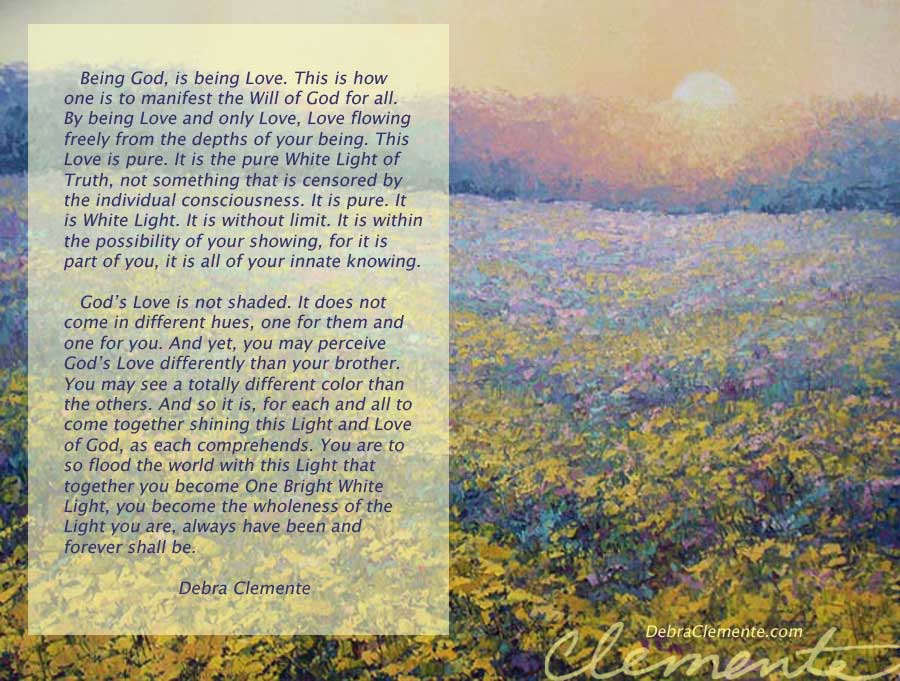The following are excerpts from the encyclical letter Lumen Fidei of the Supreme Pontiff Francis which particularly speak to me and my own experience finding and following the Divine Light of God through Christ's Love most Divine. The complete Lumen Fidei discourse is available at this link.
- Debra Clemente, author of LISTEN HEAR, A Divine Love Story
A light this powerful cannot come from ourselves but from a more primordial source: in a word, it must come from God. Faith is born of an encounter with the living God who calls us and reveals his love, a love which precedes us and upon which we can lean for security and for building our lives. Transformed by this love, we gain fresh vision, new eyes to see; we realize that it contains a great promise of fulfillment, and that a vision of the future opens up before us. Faith, received from God as a supernatural gift, becomes a light for our way, guiding our journey through time. 4. Lumen Fidei The word which God speaks to us in Jesus is not simply one word among many, but his eternal Word (cf. Heb 1:1-2). God can give no greater guarantee of his love, as Saint Paul reminds us (cf. Rom 8:31-39). Christian faith is thus faith in a perfect love, in its decisive power, in its ability to transform the world and to unfold its history. "We know and believe the love that God has for us" (1 Jn 4:16). In the love of God revealed in Jesus, faith perceives the foundation on which all reality and its final destiny rest. 15. Lumen Fidei Our culture has lost its sense of God’s tangible presence and activity in our world. We think that God is to be found in the beyond, on another level of reality, far removed from our everyday relationships. But if this were the case, if God could not act in the world, his love would not be truly powerful, truly real, and thus not even true, a love capable of delivering the bliss that it promises. It would make no difference at all whether we believed in him or not. Christians, on the contrary, profess their faith in God’s tangible and powerful love which really does act in history and determines its final destiny: a love that can be encountered, a love fully revealed in Christ’s passion, death and resurrection. 17. Lumen Fidei In faith, Christ is not simply the one in whom we believe, the supreme manifestation of God’s love; he is also the one with whom we are united precisely in order to believe. Faith does not merely gaze at Jesus, but sees things as Jesus himself sees them, with his own eyes: it is a participation in his way of seeing. In many areas in our lives we trust others who know more than we do. We trust the architect who builds our home, the pharmacist who gives us medicine for healing, the lawyer who defends us in court. We also need someone trustworthy and knowledgeable where God is concerned. Jesus, the Son of God, is the one who makes God known to us (cf. Jn 1:18). Christ’s life, his way of knowing the Father and living in complete and constant relationship with him, opens up new and inviting vistas for human experience. 18. Lumen Fidei The beginning of salvation is openness to something prior to ourselves, to a primordial gift that affirms life and sustains it in being. Only by being open to and acknowledging this gift can we be transformed, experience salvation and bear good fruit. Salvation by faith means recognizing the primacy of God’s gift. As Saint Paul puts it: "By grace you have been saved through faith, and this is not your own doing; it is the gift of God" (Eph 2:8). 19. Lumen Fidei Faith’s new way of seeing things is centered on Christ. Faith in Christ brings salvation because in him our lives become radically open to a love that precedes us, a love that transforms us from within, acting in us and through us... Christ came down to earth and rose from the dead; by his incarnation and resurrection, the Son of God embraced the whole of human life and history, and now dwells in our hearts through the Holy Spirit. Faith knows that God has drawn close to us, that Christ has been given to us as a great gift which inwardly transforms us, dwells within us and thus bestows on us the light that illumines the origin and the end of life. 20. Lumen Fidei We come to see the difference, then, which faith makes for us. Those who believe are transformed by the love to which they have opened their hearts in faith. By their openness to this offer of primordial love, their lives are enlarged and expanded. "It is no longer I who live, but Christ who lives in me" (Gal 2:20). "May Christ dwell in your hearts through faith" (Eph 3:17). The self-awareness of the believer now expands because of the presence of another; it now lives in this other and thus, in love, life takes on a whole new breadth. Here we see the Holy Spirit at work. The Christian can see with the eyes of Jesus and share in his mind, his filial disposition, because he or she shares in his love, which is the Spirit. In the love of Jesus, we receive in a certain way his vision. Without being conformed to him in love, without the presence of the Spirit, it is impossible to confess him as Lord (cf. 1 Cor 12:3). 21. Lumen Fidei Faith becomes operative in the Christian on the basis of the gift received, the love which attracts our hearts to Christ (cf. Gal 5:6), and enables us to become part of the Church’s great pilgrimage through history until the end of the world. For those who have been transformed in this way, a new way of seeing opens up, faith becomes light for their eyes. 22. Lumen Fidei The question of truth is really a question of memory, deep memory, for it deals with something prior to ourselves and can succeed in uniting us in a way that transcends our petty and limited individual consciousness. It is a question about the origin of all that is, in whose light we can glimpse the goal and thus the meaning of our common path. 25. Lumen Fidei This being the case, can Christian faith provide a service to the common good with regard to the right way of understanding truth? To answer this question, we need to reflect on the kind of knowledge involved in faith. Here a saying of Saint Paul can help us: "One believes with the heart" (Rom 10:10). In the Bible, the heart is the core of the human person, where all his or her different dimensions intersect: body and spirit, interiority and openness to the world and to others, intellect, will and affectivity. If the heart is capable of holding all these dimensions together, it is because it is where we become open to truth and love, where we let them touch us and deeply transform us. Faith transforms the whole person precisely to the extent that he or she becomes open to love. Through this blending of faith and love we come to see the kind of knowledge which faith entails, its power to convince and its ability to illumine our steps. Faith knows because it is tied to love, because love itself brings enlightenment. Faith’s understanding is born when we receive the immense love of God which transforms us inwardly and enables us to see reality with new eyes. 26. Lumen Fidei The bond between seeing and hearing in faith-knowledge is most clearly evident in John’s Gospel. For the Fourth Gospel, to believe is both to hear and to see. Faith’s hearing emerges as a form of knowing proper to love: it is a personal hearing, one which recognizes the voice of the Good Shepherd (cf. Jn 10:3-5) 30. Lumen Fidei As a truth of love, it is not one that can be imposed by force; it is not a truth that stifles the individual. Since it is born of love, it can penetrate to the heart, to the personal core of each man and woman. Clearly, then, faith is not intransigent, but grows in respectful coexistence with others. One who believes may not be presumptuous; on the contrary, truth leads to humility, since believers know that, rather than ourselves possessing truth, it is truth which embraces and possesses us. Far from making us inflexible, the security of faith sets us on a journey; it enables witness and dialogue with all. 34. Lumen Fidei Of Enoch "it was attested that he had pleased God" (Heb 11:5), something impossible apart from faith, for "whoever would approach God must believe that he exists and that he rewards those who seek him" (Heb 11:6). We can see from this that the path of religious man passes through the acknowledgment of a God who cares for us and is not impossible to find. What other reward can God give to those who seek him, if not to let himself be found? Even earlier, we encounter Abel, whose faith was praised and whose gifts, his offering of the firstlings of his flock (cf. Heb 11:4), were therefore pleasing to God. Religious man strives to see signs of God in the daily experiences of life, in the cycle of the seasons, in the fruitfulness of the earth and in the movement of the cosmos. God is light and he can be found also by those who seek him with a sincere heart. 35. Lumen Fidei An image of this seeking can be seen in the Magi, who were led to Bethlehem by the star (cf. Mt 2:1-12). For them God’s light appeared as a journey to be undertaken, a star which led them on a path of discovery. The star is a sign of God’s patience with our eyes which need to grow accustomed to his brightness. Religious man is a wayfarer; he must be ready to let himself be led, to come out of himself and to find the God of perpetual surprises. This respect on God’s part for our human eyes shows us that when we draw near to God, our human lights are not dissolved in the immensity of his light, as a star is engulfed by the dawn, but shine all the more brightly the closer they approach the primordial fire, like a mirror which reflects light. Christian faith in Jesus, the one Saviour of the world, proclaims that all God’s light is concentrated in him, in his "luminous life" which discloses the origin and the end of history.[31] There is no human experience, no journey of man to God, which cannot be taken up, illumined and purified by this light. The more Christians immerse themselves in the circle of Christ’s light, the more capable they become of understanding and accompanying the path of every man and woman towards God. Right faith orients reason to open itself to the light which comes from God, so that reason, guided by love of the truth, can come to a deeper knowledge of God. The great medieval theologians and teachers rightly held that theology, as a science of faith, is a participation in God’s own knowledge of himself. It is not just our discourse about God, but first and foremost the acceptance and the pursuit of a deeper understanding of the word which God speaks to us, the word which God speaks about himself, for he is an eternal dialogue of communion, and he allows us to enter into this dialogue.[33] 36. Lumen Fidei Those who have opened their hearts to God’s love, heard his voice and received his light, cannot keep this gift to themselves. 37. Lumen Fidei |







 RSS Feed
RSS Feed

